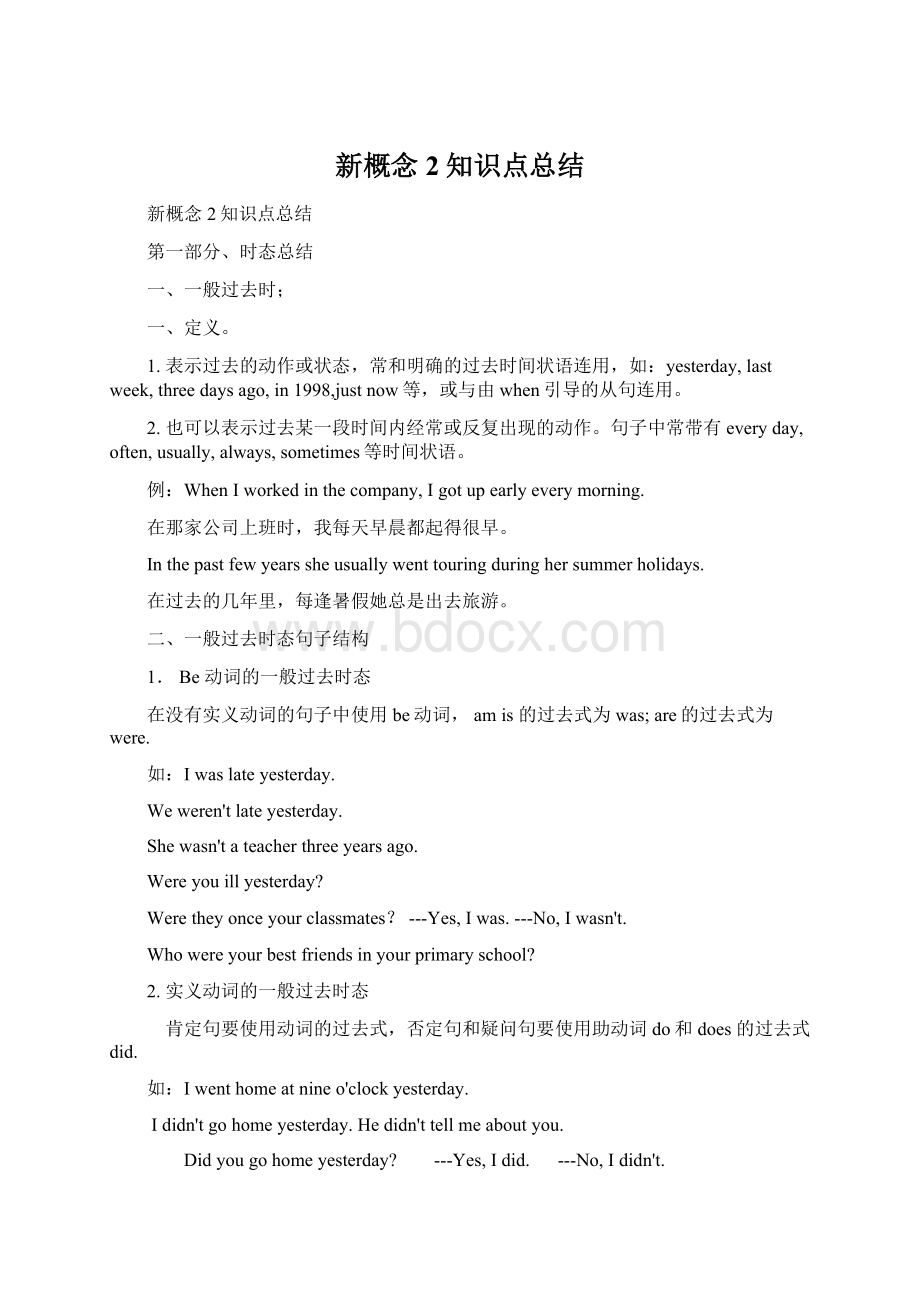新概念2知识点总结.docx
《新概念2知识点总结.docx》由会员分享,可在线阅读,更多相关《新概念2知识点总结.docx(51页珍藏版)》请在冰豆网上搜索。

新概念2知识点总结
新概念2知识点总结
第一部分、时态总结
一、一般过去时;
一、定义。
1.表示过去的动作或状态,常和明确的过去时间状语连用,如:
yesterday,lastweek,threedaysago,in1998,justnow等,或与由when引导的从句连用。
2.也可以表示过去某一段时间内经常或反复出现的动作。
句子中常带有everyday,often,usually,always,sometimes等时间状语。
例:
WhenIworkedinthecompany,Igotupearlyeverymorning.
在那家公司上班时,我每天早晨都起得很早。
Inthepastfewyearssheusuallywenttouringduringhersummerholidays.
在过去的几年里,每逢暑假她总是出去旅游。
二、一般过去时态句子结构
1.Be动词的一般过去时态
在没有实义动词的句子中使用be动词,amis的过去式为was;are的过去式为were.
如:
Iwaslateyesterday.
Weweren'tlateyesterday.
Shewasn'tateacherthreeyearsago.
Wereyouillyesterday?
Weretheyonceyourclassmates?
---Yes,Iwas.---No,Iwasn't.
Whowereyourbestfriendsinyourprimaryschool?
2.实义动词的一般过去时态
肯定句要使用动词的过去式,否定句和疑问句要使用助动词do和does的过去式did.
如:
Iwenthomeatnineo'clockyesterday.
Ididn'tgohomeyesterday.Hedidn'ttellmeaboutyou.
Didyougohomeyesterday?
---Yes,Idid. ---No,Ididn't.
Whendidyoufinishyourhomeworklastnight/thedaybeforeyesterday?
3.助动词和情态动词过去式如下:
shall―should(将要)用于第一人称单数 will―would(将要)用于所有人称
can―could(能,会)may―might(可以)must―must(必须)haveto―hadto(不得不)
助动词和情态动词的过去时态要使用他们的过去式,后面的动词还使用原形。
如:
Ihadtodomyhomeworkyesterday.(昨天我不得不做作业。
)
三、一般过去时态动词变化形式
一般过去时态由动词的过去式表示。
大多数动词的过去式是在动词原形后加上ed构成。
这类动词称为规则动词。
1)一般情况下在词尾直接加ed。
如:
play―playedwork―worked
2)以e结尾的动词只加d.如:
like---likedlove―loved
3)以辅音字母+Y结尾的动词,变Y为I,再加ed.如:
study―studied carry―carried
4)以重读闭音节结尾的动词,如果末尾只有一个辅音字母,要双写最后这个辅音字母,再加ed.如:
stop―stopped
5)不以ed结尾的过去式,称为不规则动词,如:
write(写)--wrote
go-wentdo-didhave-hadsee-sawtake-tookmake-madecome-camebuy-bought
技巧:
巧记一般过去时:
【一巧】时间状语(即标志词)巧。
一般过去时表示过去发生的动作或存在的状态,恰巧与表示过去的一些时间状语连用。
【二巧】形式巧。
它与一般现在时一样,形式多样:
当主语是第一人称单数或第三人称单数时,谓语动词用was;主语是第二人称或其他人称复数时,谓语动词用were。
例如:
Iwasintheclassroomyesterdaymorning.昨天早上我在教室里。
HewasatschoollastTuesday.上周二他在学校。
Theywereoverthereamomentago.刚才他们在那边。
【三巧】否定句结构巧。
与动词be的一般现在时一样,它在动词后面加not即可变成否定句,并且was,were与not可以缩写成wasn't,weren't。
即:
主语+wasn't/weren't+表语+其他。
例如:
Iwasnot(=wasn't)hereyesterday.昨天我不在这儿。
Myparentswerenot(=weren't)athomelastSunday.上周日我父母不在家。
【四巧】疑问句式巧。
把was,were提到句首,句末用问号即可变为一般疑问句。
即:
Was(Were)+主语+表语+其他?
这恰巧与动词be的一般现在时的疑问句式相似。
例如:
Wereyouathomethedaybeforeyesterday﹖前天你在家吗?
Wasshelatethismorning﹖今天早上她迟到了吗?
更巧的是疑问句的答语也相似,肯定回答用“Yes,主语+was/were.”;
否定回答用“No,主语+wasn't/weren't.”。
例如:
—WereWeiHuaandHanMeiherejustnow﹖刚才魏华和韩梅在这儿吗?
—Yes,theywere.(No,theyweren't.)是的,她们在。
(不,她们不在。
)
练习
一、用be动词的适当形式填空
1.I______anEnglishteachernow.
2.She_______happyyesterday.
3.They_______gladtoseeeachotherlastmonth.
4.HelenandNancy________goodfriends.
5.Thelittledog_______twoyearsoldthisyear.
6.Look,there________lotsofgrapeshere.
7.Today_______thesecondofJune.Yesterday______thefirstofJune.It_____Children'sDay.
二、用动词的适当形式填空
1.I______(watch)acartoononSaturday.
2.Herfather_______(read)anewspaperlastnight.
3.We_________tozooyesterday,we_____tothepark.(go)
4.______you_______(visit)yourrelativeslastSpringFestival?
5.______he_______(fly)akiteonSunday?
Yes,he______.
6.Jim_______(pull)upcarrotslastNationalDayholiday.
7.I____________(sweep)theflooryesterday.
8.What______she_______(find)inthegardenlastmorning?
She__________(find)abeautifulbutterfly.
1.He_________(live)inWuxitwoyearsago.
2.Thecat________(eat)abirdlastnight.
3.We_______(have)apartylastHalloween.
4.Nancy________(pick)uporangesonthefarmlastweek.
5.I________(make)amodelshipwithMikeyesterday.
6.They________(play)chessintheclassroomlastPElesson.
7.Mymother_______(cook)anicefoodlastSpringFestival.
8.Thegirls________(sing)and_______(dance)attheparty.
9.It______(be)Ben'sbirthdaylastFriday.
10.Weall______(have)agoodtimelastnight.
11.He________(jump)highonlastSportsDay.
二、现在完成时
一.句型:
Eg:
Ihavefinishedmyhomework.
Hehasn’twateredtheflowers.
Havetheywatchedthefilm?
-----Yes,theyhave.----No,theyhaven’t.
二.用法
1、现在完成时表示过去发生或已经完成的动作对现在造成的影响或结果
Eg.Ihavespentallofmymoney(sofar).(含义是:
现在我没有钱花了.)
Jimhas(just/already)come.(含义:
吉姆现在在这儿)
Myfatherhasgonetowork.(含义是:
我爸爸现在不在这儿)
2、现在完成时可以用来表示发生在过去某一时刻的,持续到现在的动作(用行为动词表示)或状态(be动词表示)常与for(+时间段),since(+时间点或过去时的句子)连用.
①for+时段
②since+过去一个时间点(译为:
自从……以来)
③since+时段+ago
④since+从句(过去时)
⑤Itis+时段+since+从句(过去时)
E.g.Maryhasbeenillforthreedays.
Ihavelivedheresince1998.
三、现在完成时的标志
现在完成时的含义之一是过去完成的动作对现在仍有影响,用以下四大标志词可以表达这种含义:
*以already,just和yet为标志
Hehasalreadygotherhelp. 他已得到她的帮助。
Hehasjustseenthefilm. 他刚刚看过这场电影。
Hehasn'tcomebackyet. 他还没有回来。
*以ever和never为标志
ThisisthebestfilmIhaveeverseen. 这是我曾经看过的最好的一部电影。
HehasneverbeentoBeijing. 他从没有到过北京。
*以动作发生的次数为标志
HesayshehasbeentotheUSAthreetimes.他说他已经去过美国三次了。
*以sofar(到目前为止)为标+before
HehasgottoBeijingsofar. 到目前为止他已到了北京。
注意:
1)现在完成时不能单独与过去的时间状语连用,如yesterday,lastweek,threeyearsago等;2)不能与when连用3)现在完成时往往同表示不确定的过去时间状语连用.
四、过去分词变法小结
1、规则动词:
规则动词的过去分词的构成规则与规则动词的过去式的构成规则相同。
(1)、一般动词,在词尾直接加“ed”。
e.g.work---worked---worked
(2)、以“e”结尾的动词,只在词尾加“d”。
e.g.live---lived---lived,
(3)、以“辅音字母+y”结尾的动词,将"y"变为"i",再加“ed”。
study---studied---studied,cry---cried---cried
(4)、重读闭音节结尾,末尾只有一个辅音字母,先双写该辅音字母,再加“ed”。
stop---stopped---stopped,drop---dropped--dropped
2、不规则动词:
AAA型E.g.letletletcutcutcut
AAB型E.g.beatbeatbeaten
ABA型E.g.becomebecamebecomerunranrun
ABB型E.g.bringbroughtbroughtfeelfeltfelt
ABC型E.g.beginbeganbegundrivedrovedriven
五、易混知识辨析
1、hasgone(to),hasbeen(to)的区别
Have/Hasgone(to):
去了(现在不在说话现场)
Whereisyourfather?
HehasgonetoShanghai.
Have/Hasbeen(to):
去过(已不在去过的地方)
MyfatherhasbeentoShanghai.
2、since和for的区别
since后接时间点,如1993,lastterm,yesterday,thetimeIgotthere
for后接一段时间,表示“长达多久”,如tenyears,awhile,twodays等。
Exercise:
1、用since和for填空
1.JimhasbeeninIreland______Monday.
2.JillhasbeeninIreland______threedays.
3.HisaunthaslivedinAustralia______15days.
4.Maryisinheroffice.Shehasbeenthere______7o'clock.
5.Indiahasbeenanindependentcountry______1974.
6.Thebusislate.They'vebeenwaiting______20minutes.
7.Nobodylivesinthosehouses.Theyhavebeenempty______manyyears.
8.Mikehasbeenill______alongtime.Hehasbeeninhospital______October.
Keys:
1.since2.for3.for4.since5.since6.for7.for8.since
2、单项选择
1.-Wherehaveyou_____,Kate?
-I've______tothebank.
A.gone,gone B.been,been C.gone,been D.been,gone
2、Thefamouswriter_____onenewbookinthepasttwoyears.
A.iswritingB.waswritingC.wroteD.haswritten
3、—Ourcountry______alotsofar.
—Yes.Ihopeitwillbeeven______.
A.haschanged;wellB.changed;good
C.haschanged;betterD.changed;better
4、ZhaoLan______already______inthisschoolfortwoyears.
A.was;studyingB.will;study
C.has;studiedD.are;studying
5、We______XiaoLisinceshewasalittlegirl.
A.knowB.hadknownC.haveknownD.knew
6、—______you___yourhomeworkyet?
—Yes.I_____itamomentago.
A.Did;do;finishedB.Have;done;finished
C.Have;done;havefinishedD.will;do;finish
7、Hisfather______thePartysince1978.
A.joinedB.hasjoinedC.wasinD.hasbeenin
8、MissGreenisn'tintheoffice.she_______tothelibrary.
A.hasgoneB.wentC.willgoD.hasbeen
3、填空。
1.I____already____(see)thefilm.I________(see)itlastweek.
2._____he____(finish)hisworktoday?
Notyet.
3.Myfather____just____(come)backfromwork.Heistirednow.
4.Where’sLiMing?
He__________(go)totheteacher’soffice.
5.I__________(work)heresinceI______(move)herein1999.
6.SofarI_______________(make)quiteafewfriendshere.
7.Howlong________theWangs______________(stay)here?
Fortwoweeks.
8.I________just___________(finish)myhomework.
9.____you______(find)yoursciencebookyet?
10.I'velostmypen._________you________(see)itanywhere?
三、一般将来时
一、用法.
“will/shall+动词原形”构成的一般将来时,其被动形式为“will/shall+be+过去分词”。
(1)表示单纯的将来。
如:
Hereldersisterwillbethirtyyearsoldnextmonth.下个月她姐姐就30岁了。
(2)表示在说话时决定要去做某事。
如:
Wearereallylost.I’llstoptoasksomeonetheway.我们真的迷路了。
我要停下来问问路。
(3)用于“祈使句+连词+简单句”固定句式中。
如:
Gostraightonandyou’llseeachurch.Youwon’tmissit.
直走你就会看到一座教堂,你不会错过的。
二.一般将来时的句型(have/hasdone)
1.肯定句:
Theworkerswillbuildanewschoolherenextyear.
2.否定句:
Hewon’tplayfootballwithyoubeforehefinisheshiswork.
3.疑问句:
Willyoubebackintenminutes?
4.特殊疑问句:
Wherewillyougonextweek?
三、注意事项
1.用“begoingto+动词原形”构成的一般将来时。
(1)人作主语时表示打算,“有计划要做”。
如:
Mydaughterisgoingtobeadoctorwhenshegrowsup.我女儿打算长大后当医生。
(2)物作主语时表示目前有迹象表明将要发生某事,“有……的趋势(如天气变化)”。
如:
Lookattheblackclouds.It’sgoingtorain.看那些乌云,要下雨了。
(3).在含有条件状语从句的主从复合句中,主句一般不用be going to,而常用will(第一人称用shall)。
从句用一般现在时表示一般将来时:
如:
The football match will be put off if it rains tomorrow. 如果明天下雨,足球赛将被推迟举行。
(4).在时间、条件或让步状语从句中常用一般现在时表示将来。
如:
Theywillgohomeforthewintervacationassoonastheyfinishtheirexams.
他们一考完试就回家过寒假。
Exercise
( )1.He_______abletocomeonFridaybecausehefailsinhisexam.
A.willbenot B.willnotbe C.isgoingtobe D.isn’tgoingbe
( )2.–When________again?
--Whenhe____________,I’llletyouknow.
A.hecomes;comes B.willhecome;willcome
C.hecomes;willhecome D.willhecome;comes
( )3.DoyouthinkTom______________hisuncleifhearrives?
A.called B.ca